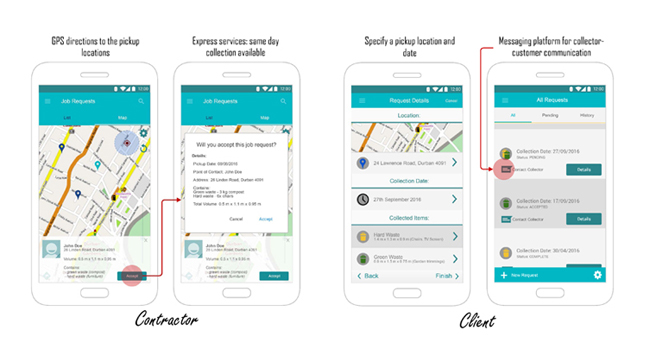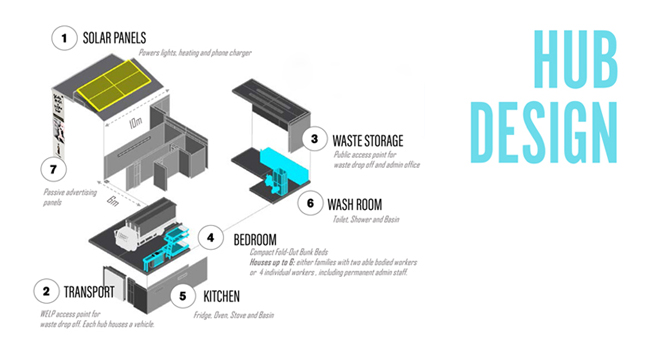Urban SOS finalist “WELP” proposes waste disposal that works for households and collectors
A finalist in the Urban SOS: Fair Share student competition, “The Waste-Help System” (WELP) proposes creating a municipal sharing platform for Durban, South Africa, that connects households with waste to collectors who earn income from disposing of it. The program would see the creation of five hubs citywide, where collectors can dispose of bulk waste and avail themselves of vital services. We talk to Mari Smith, Vivian Ly, Lixin Wang and Kate Maxfield, four students from Monash University in Australia, to find out what inspired their vision.
What attracted you to the Urban SOS competition and this year’s focus on applying sharing economy principles to address urban infrastructure challenges?
We were inspired by the way AECOM makes an impact on the world — our group wants to pursue projects that will make a difference in society. However, we don’t usually get the opportunity to engage in topical world issues as part of our coursework, and as undergraduates we don’t have the capacity to bring such projects to life in the real world. So the offer of resources and in-kind support to kick-start the winning project was what initially attracted our team to the Urban SOS competition.
As we brainstormed ideas we became increasingly invested in this year’s sharing economy theme. By incorporating sharing economy principles, we saw a potential to socially and economically empower citizens. We’ve proposed a platform integrating digital technology and urban infrastructure that facilitates entrepreneurship, community engagement and partnerships between citizens, businesses and local government.

Technology would enable households and collectors to find each other using an app or text service.
You and your team proposed a new waste management network that would benefit both households and waste collectors in Durban. What made you decide to take on the challenge of managing urban waste in South Africa?
Our motivation for tackling the issue of waste stems largely from Sumari’s experiences in South Africa. While touring Durban, she saw firsthand how pollution detracted considerably from the city’s quality of life. Though communities are receptive to responsible waste management, the current municipal system lacks the infrastructure to manage specialised waste.
Meanwhile the recycling sector has major potential for growth — growth that is hindered by difficulty accessing waste material. Only three percent of Durban’s waste is recycled, a number well below national and international standards. This was the original inspiration behind WELP. By connecting contractors and households directly via our app and SMS service, recyclers gain convenient access to specialised waste.
Our overarching goal, however, is an improved waste management network that fosters sustainability, community growth and job creation. With the world’s highest rate of HIV/AIDS and severe income inequality, Durban faces serious social challenges. This motivated us to create a multifaceted business model, complementing waste collection with opportunities for social training, such as upcycling and composting workshops.

Collectors could deposit waste at five new hubs throughout the city that would also offer essential services such as housing and bathrooms.
Your team brings together undergraduates studying very diverse disciplines including civil engineering and medicine. How did you hit upon that mix of disciplines, and what has it meant for your proposal?
Vivian teamed up with fellow engineering students Lixin and Sumari. Sumari in turn recruited Kate, whom she had met through Monash University’s Global Discovery Program.
While the problem-solving skills developed in our engineering degrees were crucial in taking this proposal from a concept to a feasible solution, as double-degree students, our specialties also lay in architecture, liberal arts, commerce, medicine and politics. Drawing on her architectural training, Sumari brought the hub design into being, and led the design of the final presentation. Vivian handled the business strategy and financial aspects. Lixin dealt with the written work and app designs. Kate explored how our project could provide benefits to local communities.
From the very beginning, we wanted a team with an expansive skillset. Through the course of this project we’ve come to truly appreciate how a multidisciplinary team can produce innovative solutions.
Urban SOS is a global innovation competition that challenges students to collaborate across disciplines to reimagine the future of our cities and pioneer unique solutions to urban challenges. The 2016 competition was themed Urban SOS: Fair Share and challenged students to combine the tools and technologies of the sharing economy with physical design to support more equitable access to resources, improve the built environment and enrich the quality of life of urban residents. Urban SOS: Fair Share was presented by AECOM and Van Alen Institute in partnership with 100 Resilient Cites. For more information on the competition visit aecom.com/urbansos.






